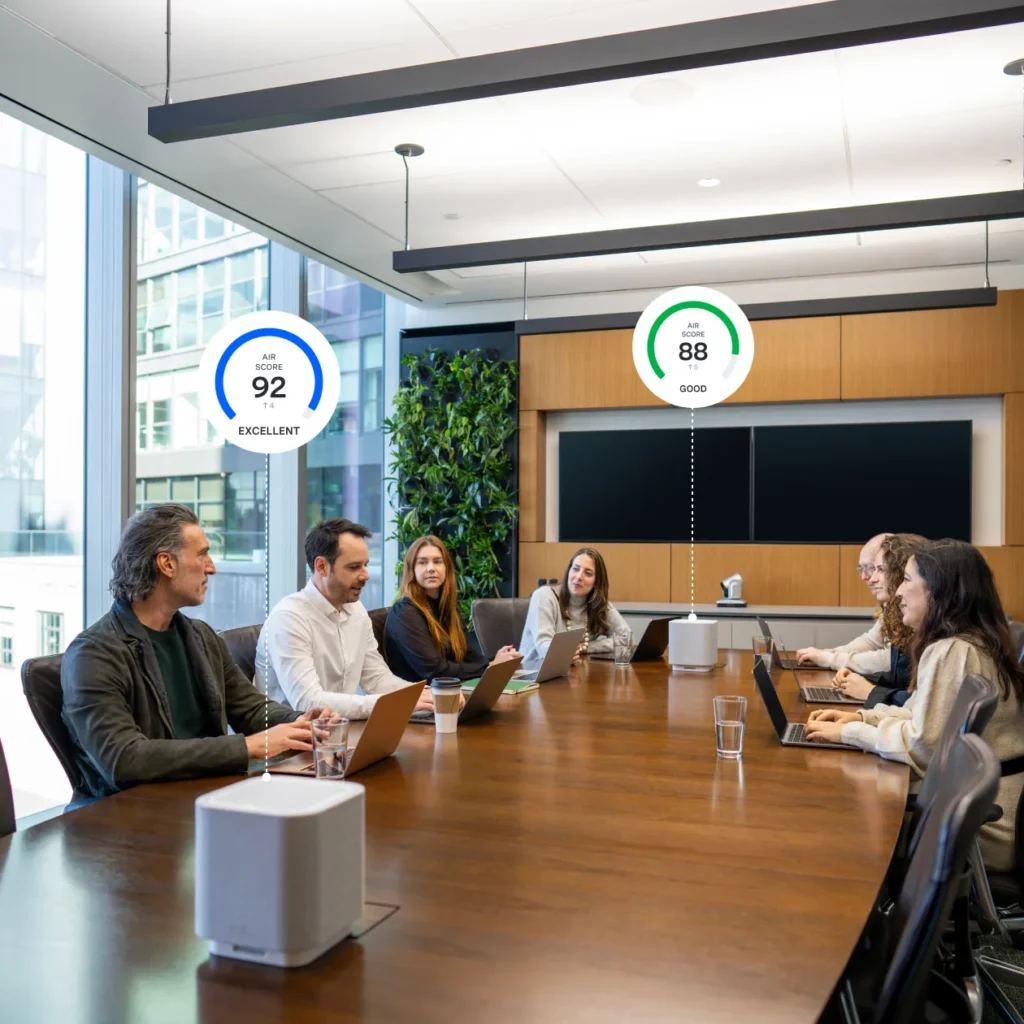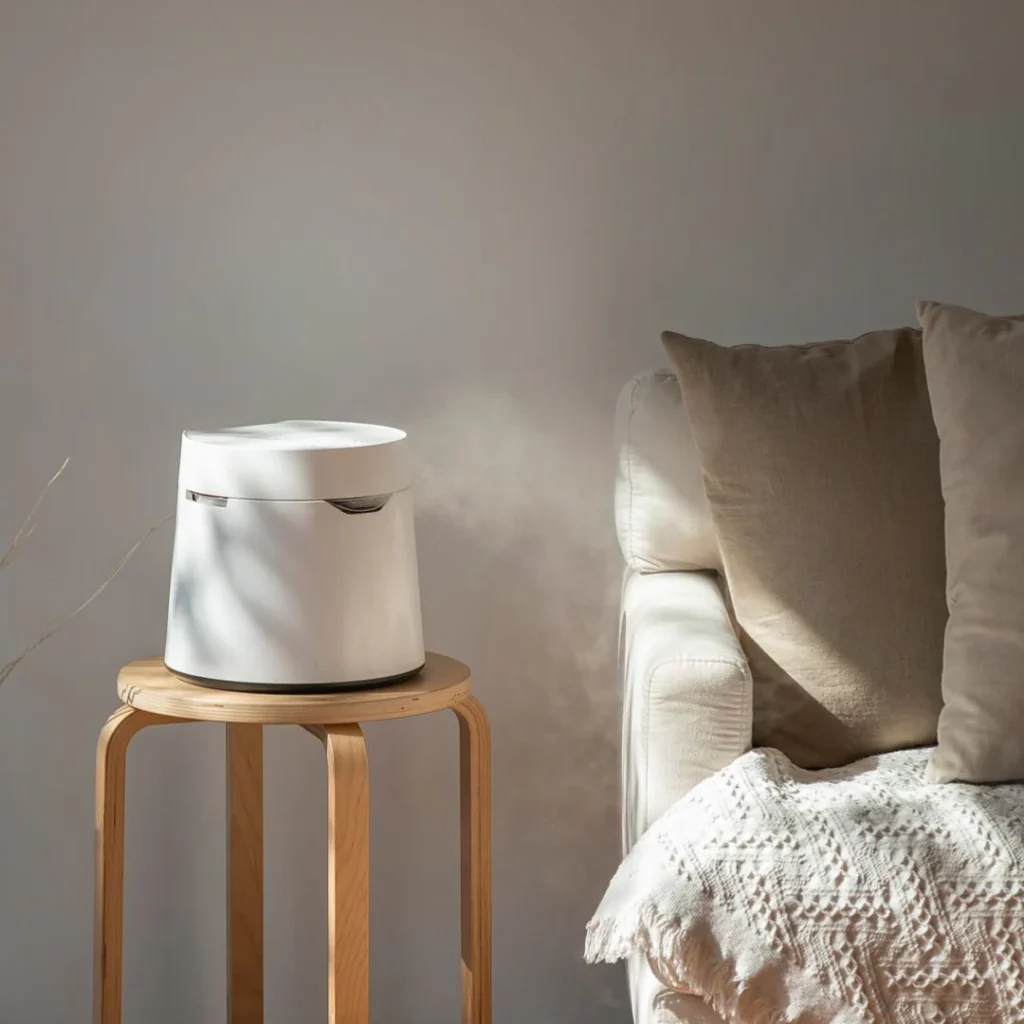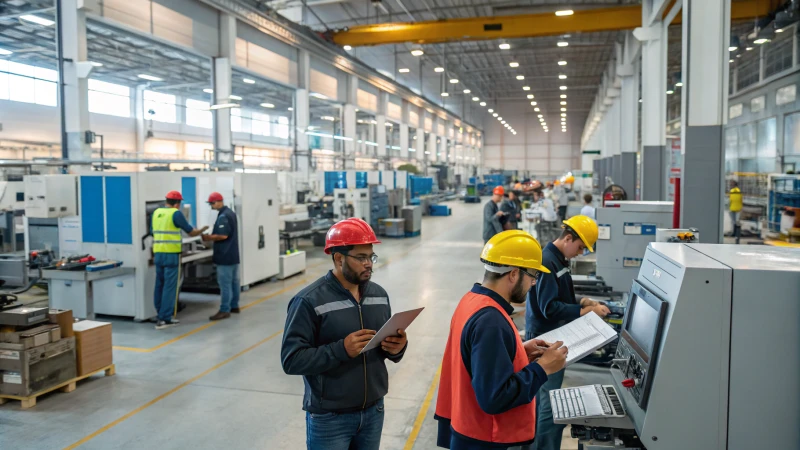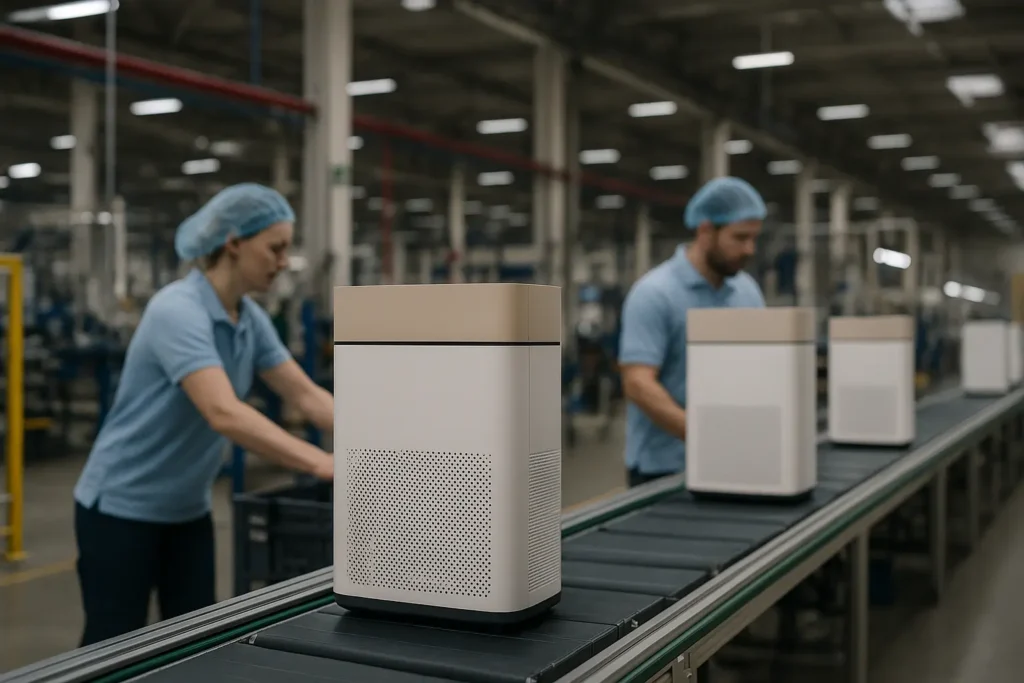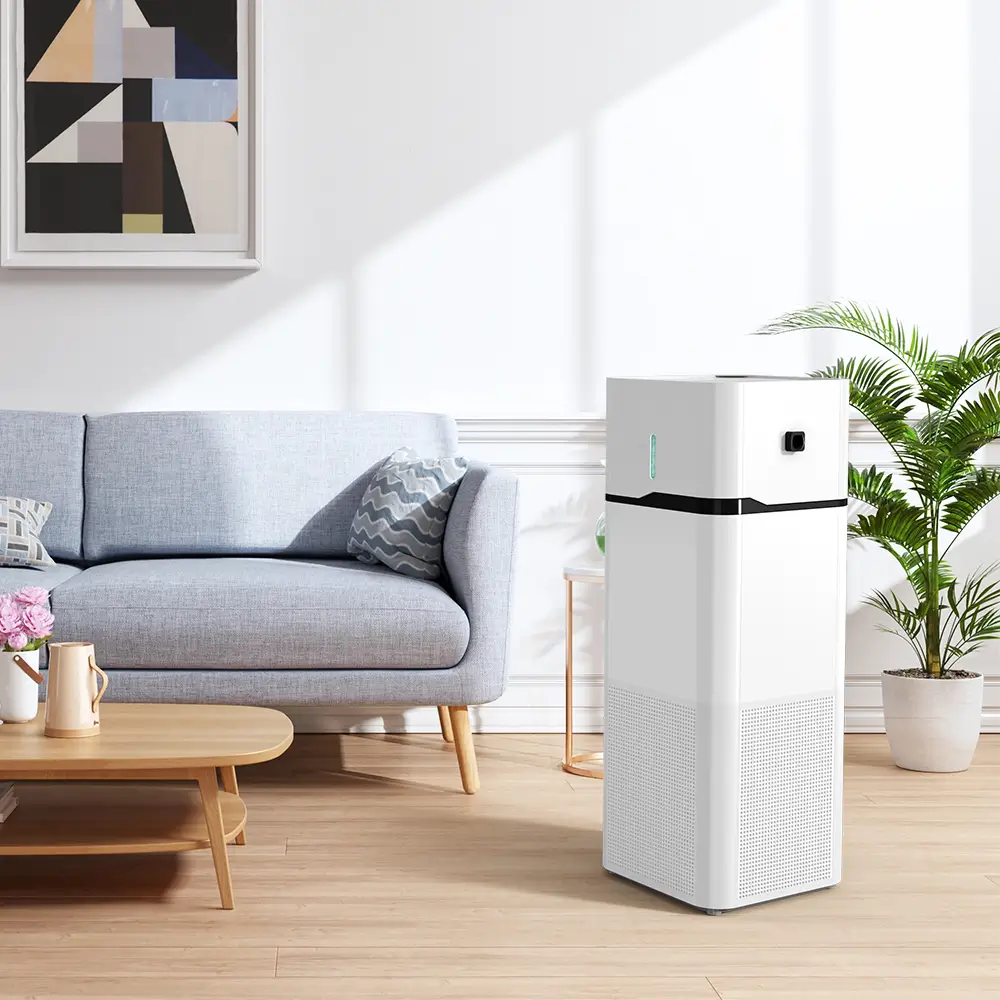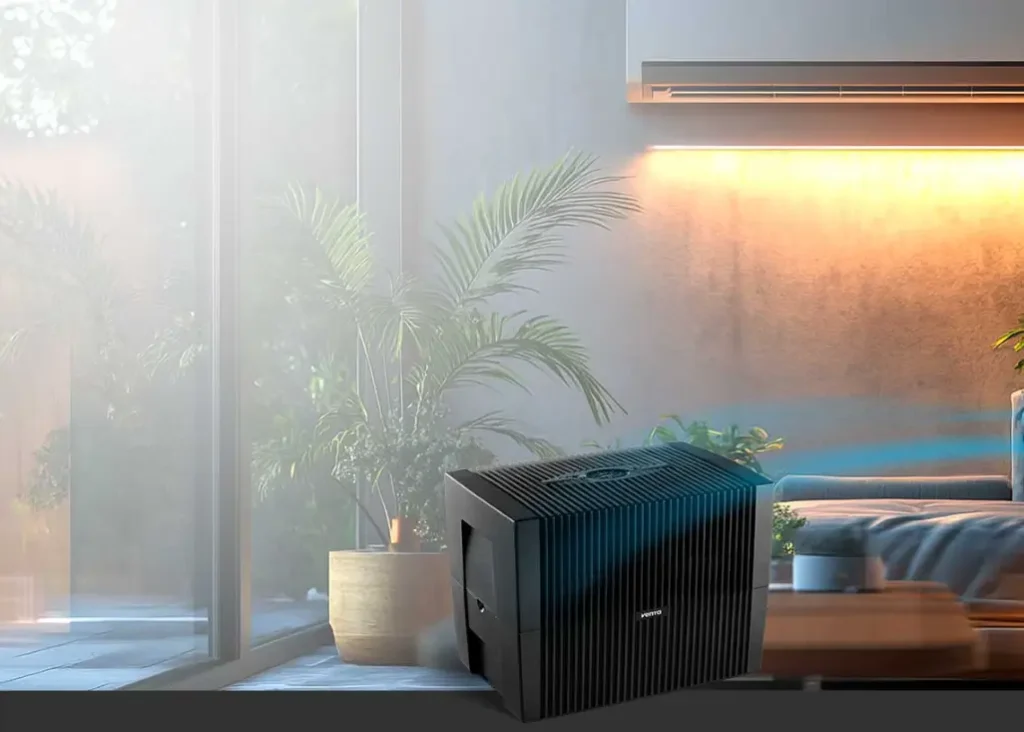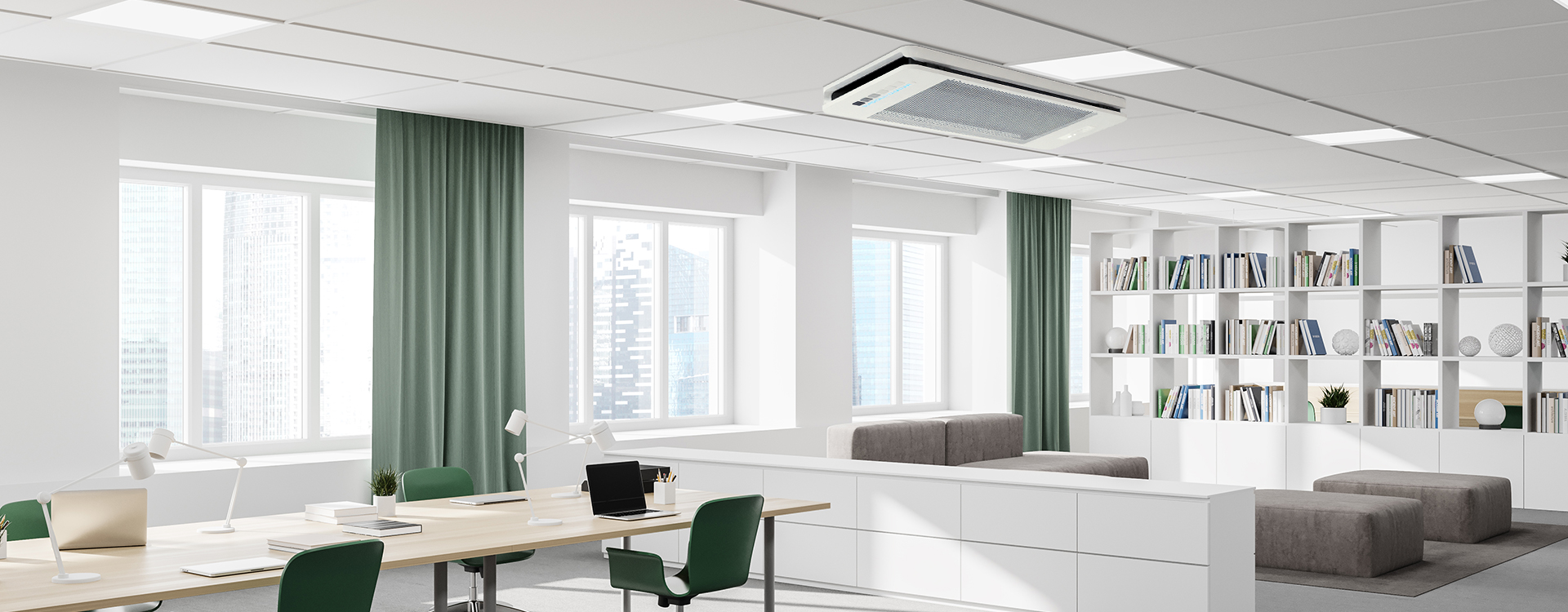
Una oficina espaciosa y bien iluminada con un purificador de aire hisoair instalado en el techo para mejorar la calidad del aire.
Introducción
Los filtros HEPA son una opción popular en la purificación del aire, ya que capturan las partículas suspendidas en el aire y mejoran la calidad del aire en diversos entornos. Pero, ¿qué hace que los filtros HEPA sean tan eficaces? ¿Son la mejor opción para todo tipo de necesidades de purificación del aire?
La contaminación del aire no es sólo un problema del exterior; la calidad del aire interior también afecta significativamente a nuestra salud. Los filtros HEPA se han convertido en esenciales en los purificadores de aire debido a su eficacia demostrada para capturar partículas como polvo, alérgenos, bacterias e incluso virus. Se utilizan ampliamente en hogares, escuelas, hospitales y oficinas por su fiabilidad y eficacia a la hora de mantener limpio el ambiente interior.
Los filtros HEPA, abreviatura de filtros de aire de partículas de alta eficiencia, son conocidos por atrapar el 99,97% de partículas de tan sólo 0,3 micras, proporcionando un aire más limpio al capturar polvo, polen, caspa de mascotas e incluso algunas bacterias y virus. Su alta eficacia los convierte en una solución fiable tanto en entornos residenciales como comerciales, ofreciendo una mejora esencial de la calidad del aire donde más se necesita.
Los filtros HEPA son muy eficaces en diversos entornos, ya que capturan el 99,97% de partículas de tan sólo 0,3 micras.Verdadero
Debido a su alta eficacia, los filtros HEPA se utilizan habitualmente en hogares, escuelas, hospitales y oficinas para mejorar la calidad del aire.
Si se pregunta si un purificador de aire con filtro HEPA es la mejor opción para su espacio, veamos con más detalle cómo funcionan los filtros HEPA, cómo se comparan con otras tecnologías de filtración y qué ventajas únicas aportan a los distintos entornos.
¿Qué es un filtro HEPA?
HEPA (aire particulado de alta eficiencia) Los filtros están diseñados para atrapar el 99,97% de partículas de hasta 0,3 micras, lo cual es Eficacia de filtración HEPA1incluyendo polvo, polen, caspa de mascotas y ciertas bacterias y virus. Este nivel de filtración es ideal para entornos que requieren altos estándares de calidad del aire, como hogares, hospitales y oficinas.
Por qué los filtros HEPA son muy eficaces para limpiar el aire
Los filtros HEPA son excelentes para capturar partículas diminutas, proporcionando así un ambiente interior más limpio y saludable. Son especialmente beneficiosos para las personas con alergias o sensibilidad respiratoria, ya que reducen los alérgenos y contaminantes comunes en interiores.
¿Cómo atrapan los filtros HEPA los contaminantes del aire?
Los filtros HEPA están formados por una densa red de fibras que capturan partículas mediante diversos mecanismos de filtración, como la interceptación, la impactación y la difusión. A medida que el aire fluye a través del filtro, estas fibras atrapan partículas grandes y pequeñas, garantizando un alto nivel de limpieza y calidad del aire.
Sí, los filtros HEPA son adecuados para instalaciones médicas.Verdadero
Debido a su alta eficacia, los filtros HEPA se utilizan a menudo en entornos médicos para garantizar un aire libre de contaminantes.
¿Por qué son eficaces los filtros HEPA en los purificadores de aire?
Los filtros HEPA son muy eficaces gracias a su diseño exclusivo, que les permite capturar una amplia gama de partículas suspendidas en el aire. En entornos sensibles como las instalaciones médicas, esta eficacia es crucial para mantener una calidad del aire segura y limpia.
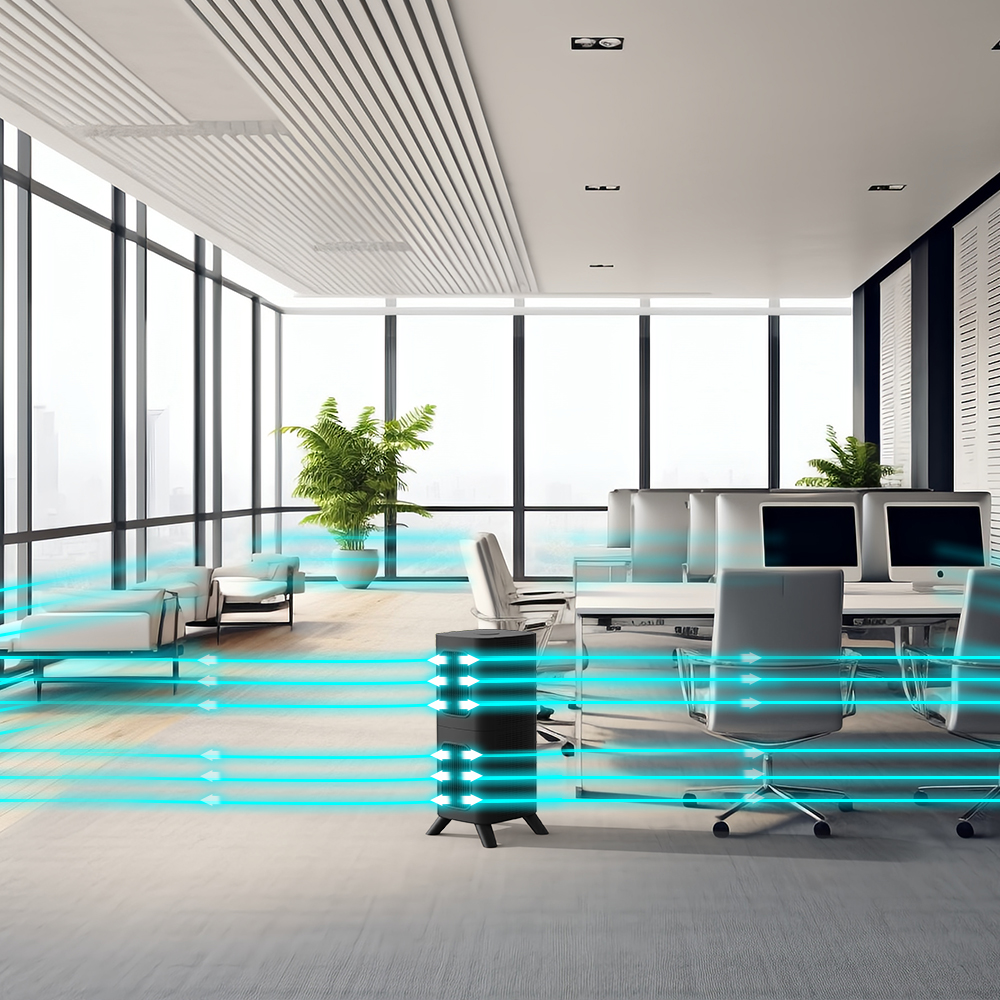
Unidad purificadora de aire con filtro HEPA instalada en una sala de oficina
Comprender el funcionamiento de los filtros HEPA
Los filtros HEPA funcionan haciendo pasar el aire a través de una fina malla, que atrapa las partículas nocivas con mayor eficacia que los filtros convencionales en lugar de Uso médico de los filtros HEPA2. Estos filtros funcionan continuamente dentro de los purificadores de aire para mantener un alto nivel de limpieza del aire en cualquier espacio en el que se utilicen.
¿Por qué destacan los filtros HEPA?
La estructura de los filtros HEPA les permite capturar partículas de hasta 0,3 micras, lo que los hace increíblemente eficaces contra los contaminantes comunes de interiores, incluidos alérgenos, polvo y patógenos. Esta tecnología es esencial en entornos en los que es crucial mantener niveles bajos de contaminantes.
¿Filtros HEPA frente a otras tecnologías de filtración?
¿Cómo se comparan los filtros HEPA con otras tecnologías de purificación del aire, como los generadores de iones, los filtros de plasma o la luz ultravioleta? Cada tecnología tiene sus puntos fuertes y débiles, pero los filtros HEPA destacan como una opción más segura y fiable para la salud humana.
Principales diferencias entre los filtros HEPA y otros filtros
A diferencia de la tecnología de ionización y plasma, que puede producir ozono como subproducto, los filtros HEPA atrapan las partículas sin liberar emisiones nocivas, lo que los convierte en la opción preferida para mejorar la calidad del aire interior.
¿Son más seguros los filtros HEPA para uso continuo?
Las tecnologías de ionización y plasma liberan iones o partículas reactivas que pueden provocar la formación de ozono, un irritante respiratorio. Riesgos de la filtración por ionización3. Los filtros HEPA evitan este problema capturando físicamente las partículas, lo que los convierte en una opción más segura para el uso continuo en hogares, escuelas y lugares de trabajo.
Los filtros HEPA pueden atrapar gases como los COV.Falso
Los filtros HEPA están diseñados para capturar partículas, no gases ni olores; para los COV se necesita un filtro de carbón activado.
Comparación de tecnologías de filtración
He aquí una rápida comparación de varias tecnologías de filtración para destacar sus puntos fuertes y sus mejores aplicaciones:
| Tecnología de filtración | Eficacia | Subproductos | Aplicaciones comunes | Principales ventajas | Limitaciones |
|---|---|---|---|---|---|
| Filtro HEPA | Alta | Ninguno | Hogares, hospitales, | Elimina 99,97% de partículas | No elimina gases como los COV4 |
| oficinas | hasta 0,3 micras | ||||
| Carbón activado | Moderado | Ninguno | Purificadores de aire, HVAC | Adsorbe COV, olores | Menos eficaz para las partículas |
| Generador de iones | Moderado | Ozono | Industrial, | Reduce los alérgenos y las partículas | El ozono puede irritar las vías respiratorias |
| purificadores de aire | |||||
| Luz UV-C | Variable | Ninguno | Hospitales, laboratorios, | Destruye bacterias y virus | Eficacia limitada para las partículas |
| purificadores de aire | |||||
| Tecnología de plasma | Alta | Ozono | Industrial | Eficaz para la esterilización | Produce partículas reactivas |
Usos ideales de los filtros HEPA
Los filtros HEPA son muy adaptables y pueden utilizarse en diversos entornos, como hogares, oficinas e instalaciones médicas. Son especialmente eficaces para reducir alérgenos y patógenos, creando un ambiente interior más saludable.
¿A quién benefician más los filtros HEPA?
Los filtros HEPA son más beneficiosos en entornos en los que es esencial una alta pureza del aire, como instalaciones médicas, escuelas y hogares con personas sensibles a las alergias.
Aplicaciones detalladas de la tecnología HEPA
Al atrapar partículas finas, los filtros HEPA reducen los alérgenos y patógenos, lo que los hace ideales para hogares, oficinas y hospitales. Proporcionan una solución fiable para la calidad del aire donde más se necesita.
¿Qué significa HEPA?
HEPA, o Aire con partículas de alta eficienciaes un nivel de filtración estandarizado que exige la eliminación del 99,97% de partículas de hasta 0,3 micras, lo que contribuye a un ambiente interior más saludable. Filtración HEPA y COV4.
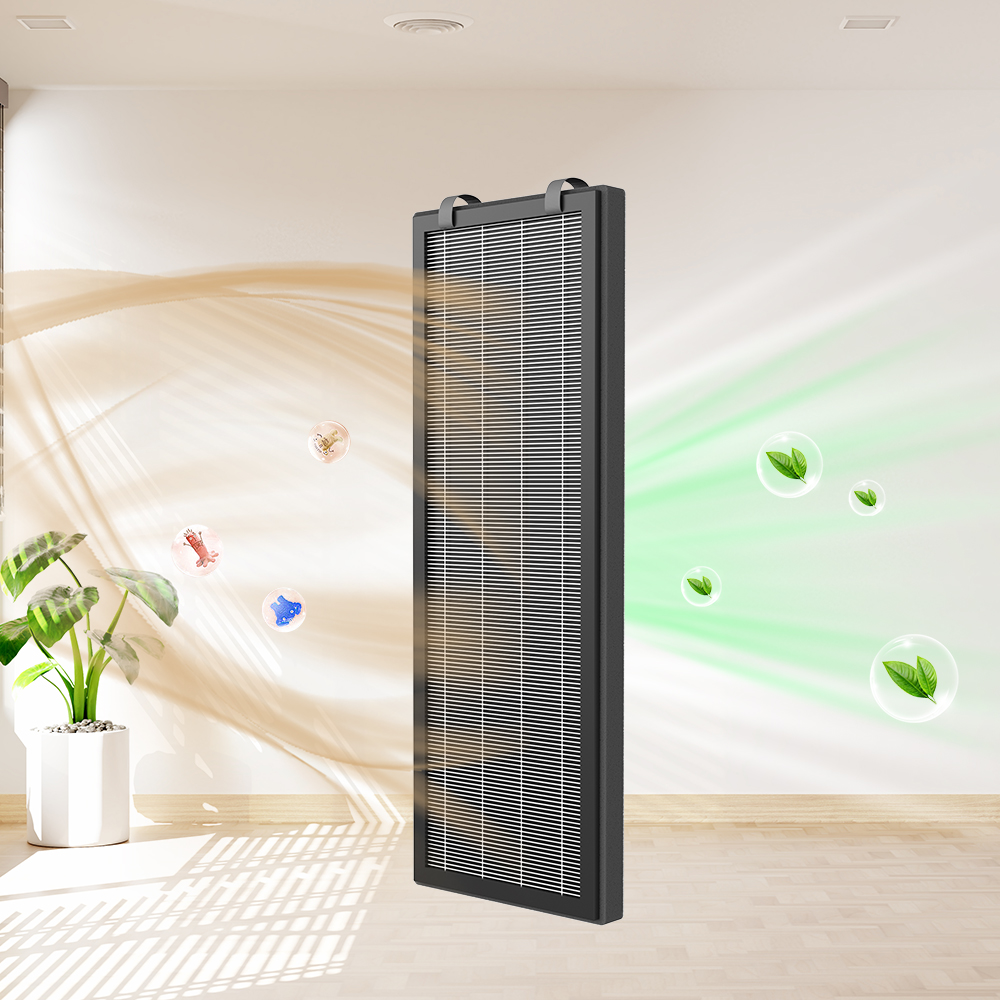
Filtro HEPA HisoAir de repuesto para purificador de aire
Orígenes y avances de la tecnología HEPA
Desarrollada inicialmente por el ejército estadounidense durante la Segunda Guerra Mundial para filtrar partículas radiactivas, la tecnología HEPA ha evolucionado hasta convertirse en un componente fundamental en la purificación del aire para uso comercial y residencial. Los filtros HEPA actuales ofrecen un flujo de aire mejorado con una resistencia reducida.
Desarrollo histórico de los filtros HEPA
Diseñados originalmente para uso militar, los filtros HEPA se han adaptado desde entonces para satisfacer las necesidades de filtración de alta eficacia de los entornos modernos, incluidos los hogares y los lugares de trabajo.
Avances modernos en tecnología HEPA
Los filtros HEPA modernos incorporan medios avanzados que permiten un alto flujo de aire y una baja resistencia, lo que los hace más silenciosos y eficaces en los purificadores de aire que se utilizan hoy en día.
¿Por qué los filtros HEPA necesitan filtros de carbón?
Aunque los filtros HEPA son excepcionales para capturar partículas, no eliminan gases ni olores. Los filtros de carbón activo complementan a los filtros HEPA adsorbiendo compuestos orgánicos volátiles (COV) y olores desagradables.
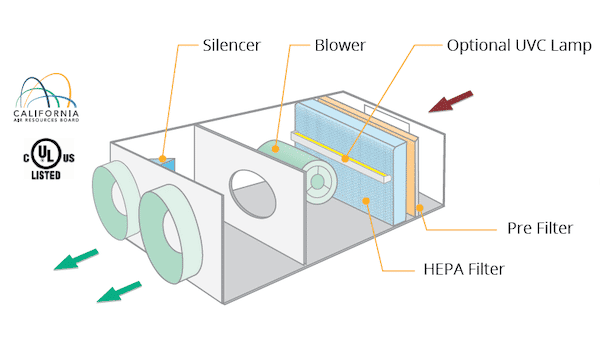
Esquema de un purificador de aire basado en filtros
Filtración completa con filtros dobles
La combinación de filtros HEPA y de carbón activo garantiza una purificación completa del aire, ya que elimina tanto las partículas como los gases. Este doble enfoque es especialmente eficaz en entornos en los que los COV son un problema.
Ventajas de utilizar filtros HEPA y de carbón
En espacios con partículas y contaminantes gaseosos, la combinación de filtros HEPA y de carbón ofrece una solución completa de purificación del aire, que aborda un espectro más amplio de contaminantes.
Ventajas de los filtros HEPA en los purificadores de aire
Los filtros HEPA son una opción muy eficaz y de bajo mantenimiento para mejorar la calidad del aire a largo plazo. Reducen los contaminantes y mejoran la calidad del aire en cualquier ambiente interior.

Purificador en el salón
Por qué los filtros HEPA son ideales para hogares y espacios de trabajo
Los filtros HEPA reducen los alérgenos, el polvo y la caspa de las mascotas, ofreciendo un aire más limpio y saludable en el interior. Su escaso mantenimiento los convierte en una opción cómoda para un uso prolongado.
Eficaz y duradero
Los filtros HEPA sólo requieren sustitución cada 6-12 meses, dependiendo del uso. Su durabilidad y eficacia los convierten en una opción rentable para una gestión sostenida de la calidad del aire.
Conclusión
Los filtros HEPA ofrecen una solución probada para mejorar la calidad del aire interior mediante la captura de partículas finas, garantizando entornos más limpios y saludables. Desarrollados inicialmente por el ejército, los filtros HEPA siguen siendo la opción preferida para la purificación del aire en hogares, lugares de trabajo e instalaciones médicas, gracias a su seguridad, fiabilidad y continuos avances.
-
[Eficacia de filtración HEPA]: Los filtros HEPA eliminan el 99,97% de partículas a 0,3 micras, lo que los hace ideales para eliminar partículas finas y alérgenos. ↩
-
[Uso médico de los filtros HEPA]: Los filtros HEPA se utilizan habitualmente en instalaciones médicas para garantizar un aire libre de patógenos y reducir la contaminación. ↩
-
[Riesgos de la filtración por ionización]: Las tecnologías de ionización y plasma pueden emitir ozono, que puede irritar el sistema respiratorio. ↩
-
[Filtración HEPA y COV]: Mientras que HEPA es eficaz para las partículas, los COV requieren un filtro de carbón activado para su absorción. ↩ ↩


